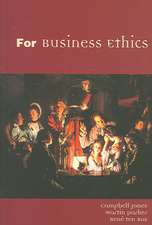The Global Corporation: Sustainable, Effective and Ethical Practices, A Case Book
Editat de Laura P. Hartman, Patricia H. Werhaneen Limba Engleză Paperback – 10 iun 2009
The book is not, however, merely a descriptive iteration of effective corporate conduct. The editors conclude with an analysis of frameworks for corporate and managerial ethical decision-making - frameworks that help to establish models for best practices. These frameworks then can be generalized and applied to other corporate situations, and replicated by other companies in their search for excellence and the resulting avoidance of misconduct.
| Toate formatele și edițiile | Preț | Express |
|---|---|---|
| Paperback (1) | 513.43 lei 43-57 zile | |
| Taylor & Francis – 10 iun 2009 | 513.43 lei 43-57 zile | |
| Hardback (1) | 1018.26 lei 43-57 zile | |
| Taylor & Francis – 10 iun 2009 | 1018.26 lei 43-57 zile |
Preț: 513.43 lei
Preț vechi: 604.03 lei
-15% Nou
Puncte Express: 770
Preț estimativ în valută:
98.25€ • 102.84$ • 81.77£
98.25€ • 102.84$ • 81.77£
Carte tipărită la comandă
Livrare economică 31 martie-14 aprilie
Preluare comenzi: 021 569.72.76
Specificații
ISBN-13: 9780415801607
ISBN-10: 0415801605
Pagini: 440
Ilustrații: 23 b/w images, 41 tables, 11 halftones and 13 line drawings
Dimensiuni: 178 x 254 x 25 mm
Greutate: 0.81 kg
Ediția:1
Editura: Taylor & Francis
Colecția Routledge
Locul publicării:Oxford, United Kingdom
ISBN-10: 0415801605
Pagini: 440
Ilustrații: 23 b/w images, 41 tables, 11 halftones and 13 line drawings
Dimensiuni: 178 x 254 x 25 mm
Greutate: 0.81 kg
Ediția:1
Editura: Taylor & Francis
Colecția Routledge
Locul publicării:Oxford, United Kingdom
Cuprins
1. Introduction 2. Seminal/Paradigm Cases 2.1 Johnson & Johnson’s Tylenol Controversies 2.2 Merck Co., Inc. (A) 3. Pharmaceutical: Contemporary Cases 3.1 Abbott and the AIDS Crisis 3.2 HealthReach and Habla 3.3 The Novartis Foundation for Sustainable Development: Tackling HIV/AIDS and Poverty in South Africa 4. Energy: Contemporary Cases 4.1 Eskom and the South African Electrification Program 4.2 ExxonMobil and the Chad and Cameroon Pipeline 5. Global Poverty: Contemporary Cases 5.1 Hindustan Lever Limited (HLL)and Project Sting 5.2 Enabling the Poor to Build Housing: Pursuing Profit and Social Development Together: Cemex and Patrimonio Hoy 5.3 Manila Water Company 5.4 Proctor and Gamble: Children’s Safe Drinking Water 5.5 Islamic Banking and Finance: Moral Beliefs and Business Practices at Work 5.6 BHP Billiton and Mozal 6. Employment: Contemporary Cases 6.1 First Impressions, Inc. 6.2 Nike, Inc. 6.3 Started as Crew: McDonald’s Strategy for Corporate Success and Poverty Reduction 6.4 The Marriott Corporation’s Human Resources Department: Managing a Low-Wage Workforce 7. Operating in Corrupt Environments: Contemporary Cases 7.1 Econet Wireless Zimbabwe 7.2 Infosys Technologies: Powered by Intellect, Driven by Values 7.3 Resisting Bureaucratic Corruption: Alacrity Housing Chennai 8. Sustaining the Environment: Contemporary Cases 8.1 Unilever: Corporate Venturing and Environmental Sustainability 8.2 DesignTex, Incorporated 8.3 Rohner Textil AG 9. Leadership: Contemporary Cases 9.1 Developing Responsible Leaders as Agents of World Benefit: Learnings from Project Ulysses The Female Health Company 9.2 The Female Health Company 10. Conclusion - Framing the Narratives: Future Directions for Ethics and Corporate Responsibility
Notă biografică
Laura P. Hartman is a Professor of Business Ethics and Legal Studies in the Management Department at DePaul University’s College of Commerce and also serves as Research Director of DePaul’s Institute for Business and Professional Ethics. She has served as the Gourlay Professor at the Melbourne Business School/Trinity College at the University of Melbourne (2007-2008), as an invited professor at INSEAD (France), HEC (France), the Université Paul Cezanne Aix Marseille III and at the Grenoble Graduate School of Business, among other European universities.
Patricia H. Werhane is the Peter and Adeline Ruffin Chair of Business Ethics and Senior Fellow at the Olsson Center for Applied Ethics in the Darden Graduate School of Business Administration at the University of Virginia and also hold a joint appointment as the Callista Wicklander Chair of Business Ethics and Director, Institute for Business and Professional Ethics, at DePaul University. She has been a Rockefeller Fellow at Dartmouth College, an Arthur Andersen Fellow at the Judge Institute, Cambridge University, and Erskine Visiting Fellow at the University of Canterbury in New Zealand. She is the founding editor of Business Ethics Quarterly.
Patricia H. Werhane is the Peter and Adeline Ruffin Chair of Business Ethics and Senior Fellow at the Olsson Center for Applied Ethics in the Darden Graduate School of Business Administration at the University of Virginia and also hold a joint appointment as the Callista Wicklander Chair of Business Ethics and Director, Institute for Business and Professional Ethics, at DePaul University. She has been a Rockefeller Fellow at Dartmouth College, an Arthur Andersen Fellow at the Judge Institute, Cambridge University, and Erskine Visiting Fellow at the University of Canterbury in New Zealand. She is the founding editor of Business Ethics Quarterly.
Recenzii
"This is a terrific resource for globalizing the discussion of business ethics. Real cases….real business issues…real ethical challenges."
—R. Edward Freeman, Academic Director of the Business Roundtable Institute for Corporate Ethics and Olsson Professor of Business Administration at the University of Virginia’s Darden School of Business
"Hartman and Werhane offer an excellent selection of cases that can help prepare future leaders for the serious social and ecological issues that global firms will undoubtedly face. Tackling issues as wide-ranging as ensuring safe water supplies, access to pharmaceuticals, labor conditions, managing diversity, and bottom-of-the-pyramid approaches to poverty reduction, to name only a few, Hartman and Werhane provide up-to-date cases, as well as a couple of classics, that can help guide future leaders’ understanding of the important roles that businesses can—and need to—play in society today and into the future."
—Sandra Waddock, Galligan Chair of Strategy, Professor of Management, Boston College
"At long last, a truly international business ethics case book! Hartman and Werhane have provided a comprehensive set of superbly written cases that cover all the important ethical issues in international business, including the environment, global poverty, operating in corrupt environments, and the obligations of pharmaceutical companies, among other topics. The cases are just the right length for classroom discussion.
Moreover, their book has outstanding coverage of Africa and Asia. Good cases from the U.S. and Europe are included in ways that enrich but do not dominate. This case book could be used any where in the world. Professors Hartman and Werhane have produced the best international business ethics case book available today."
—Norman E. Bowie, Elmer L. Andersen Chair, University of Minnesota
—R. Edward Freeman, Academic Director of the Business Roundtable Institute for Corporate Ethics and Olsson Professor of Business Administration at the University of Virginia’s Darden School of Business
"Hartman and Werhane offer an excellent selection of cases that can help prepare future leaders for the serious social and ecological issues that global firms will undoubtedly face. Tackling issues as wide-ranging as ensuring safe water supplies, access to pharmaceuticals, labor conditions, managing diversity, and bottom-of-the-pyramid approaches to poverty reduction, to name only a few, Hartman and Werhane provide up-to-date cases, as well as a couple of classics, that can help guide future leaders’ understanding of the important roles that businesses can—and need to—play in society today and into the future."
—Sandra Waddock, Galligan Chair of Strategy, Professor of Management, Boston College
"At long last, a truly international business ethics case book! Hartman and Werhane have provided a comprehensive set of superbly written cases that cover all the important ethical issues in international business, including the environment, global poverty, operating in corrupt environments, and the obligations of pharmaceutical companies, among other topics. The cases are just the right length for classroom discussion.
Moreover, their book has outstanding coverage of Africa and Asia. Good cases from the U.S. and Europe are included in ways that enrich but do not dominate. This case book could be used any where in the world. Professors Hartman and Werhane have produced the best international business ethics case book available today."
—Norman E. Bowie, Elmer L. Andersen Chair, University of Minnesota
Descriere
The text is comprised of a series of case studies focusing on specific instances of corporate best practices. The companies in this study are not perfect companies. Many of them have a "past" that includes questionable practices. But these are companies that work to foster trust both inside the company and in their relationships with customers, suppliers, shareholders and the communities in which they operate., The study will not be merely a descriptive iteration of good corporate conduct, however. Rather, in the last chapter focuses on and extract the frameworks embedded in corporate decision-making that incorporate and integrate ethics as one of the key components in the decision process.
The text will include case narratives presenting specific examples of "best practices" of leading companies, devoting one chapter to each case. The book concludes with a careful examination of how and in what ways programs a particular company has in place (including mission and values statements, codes, ethics and compliance programs, stories of company heroes, etc.) respond to issues or challenges when they arise. The processes that helped that company to avoid a crisis and to achieve some positive ethical outcomes are outlined. The book concludes with analysis of frameworks for corporate and managerial ethical decision-making, frameworks that help to establish models for best practices. These frameworks will be such that they can be generalized to other corporate situations and replicated by other companies in their search for excellence or the avoidance of misconduct.
The text will include case narratives presenting specific examples of "best practices" of leading companies, devoting one chapter to each case. The book concludes with a careful examination of how and in what ways programs a particular company has in place (including mission and values statements, codes, ethics and compliance programs, stories of company heroes, etc.) respond to issues or challenges when they arise. The processes that helped that company to avoid a crisis and to achieve some positive ethical outcomes are outlined. The book concludes with analysis of frameworks for corporate and managerial ethical decision-making, frameworks that help to establish models for best practices. These frameworks will be such that they can be generalized to other corporate situations and replicated by other companies in their search for excellence or the avoidance of misconduct.












